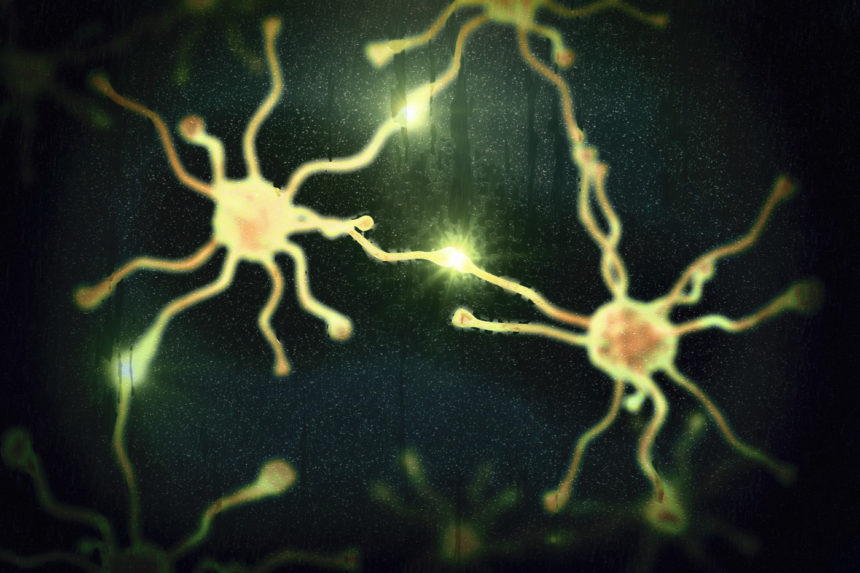This post was originally published on this site
Inhibition of a protein called LIMK1 may help prevent the loss of dendritic spines — the connections between neurons in the brain — triggered by the build-up of beta-amyloid in early stage Alzheimer’s disease, a study has found.
“This is the first study to showcase that inhibiting LIMK1 could provide a protective effect for dendritic spines,” Jeremy Herskowitz, PhD, said in a press release. Herskowitz is the study’s lead author and an assistant professor in the department of neurology, School of Medicine at University of Alabama at Birmingham (UBA).
“In animal models, we’ve shown that increased activity of LIMK1 is linked to changes in the length and density of dendritic spines, which has implications for Alzheimer’s,” Herskowitz said.
The study, “Pharmacologic inhibition of LIMK1 provides dendritic spine resilience against β-amyloid,” was published in the journal Science Signaling.
Loss of dendritic spines correlates more strongly with cognitive impairment in Alzheimer’s than with the presence of amyloid plaques and tau tangles, two hallmarks of the disease. In fact, previous studies by the same team have shown that people carrying more and longer dendritic spines do not develop symptoms of dementia, even in the presence of beta-amyloid and tau tangles.
“These findings emphasize dendritic spines as therapeutic substrates with potential to protect cognitively normal patients at high risk for dementia,” the researchers wrote.
The levels of two proteins, called Rho-associated kinases (ROCKs), are increased among patients with mild cognitive impairment (MCI), a neurological condition in which individuals experience subtle changes in memory, and early Alzheimer’s. This suggests that ROCKs may play a role in the early stages of the disease and has led to a great effort to develop therapeutic inhibitors of ROCK kinases.
However, “ROCK kinases are proving to be challenging drug targets because inhibiting them may cause severe side effects — including a drop in blood pressure significant enough to cause death,” Herskowitz explained.
The side effects linked with ROCK inhibitors has halted their testing in clinical trials for Alzheimer’s disease. Now, Herskowitz’ team investigated the mechanisms by which two ROCK kinases, ROCK 1 and ROCK2, are linked to Alzheimer’s.
They found that these kinases regulated the number and size of dendritic spines via specific mechanisms. Specifically, ROCK 2 induced spine loss through the serine and threonine kinase LIMK1.
“LIMK1, downstream in the signaling pathway, is regulated by the ROCK kinases, particularly ROCK 2. As far as we know now, inhibition of LIMK1 has no effect on ROCK, and so it may not carry the same severe side effects,” Herskowitz said.
While “in a healthy brain, LIMK1 appears to regulate the size and density of dendritic spines,” he continued, “in dementia, the enzyme is overactive, leading to damage to the spines. In this study, we were able to provide a protective effect to the dendritic spines by means of an experimental drug that inhibited activity of LIMK1.”
Beta-amyloid plaques damage and destroy dendritic spines in cellular and animal models of Alzheimer’s. Using rat hippocampal neurons, researchers showed that beta-amyloid-induced degeneration of the spines was mainly mediated by the ROCK2-LIMK1 pathway.
These findings prompted them to test whether inhibiting LIMK1 activity could halt spines’ degeneration.
The team exposed rat hippocampal neurons to a toxic form of beta-amyloid and treated those neurons with SR7826, an investigational LIMK1 inhibitor being developed as a potential cancer therapy, since LIMK1 also is believed to promote cancer spreading.
SR7826 halted the degeneration of the spines. Moreover, treating a mouse model of Alzheimer’s with a single oral dose of SR7826 for 10 days significantly increased dendritic spine density and length compared to mock-treated mice.
“The drug had remarkable effects on the dendritic spines, results that we feel are significant and promising,” said Herskowitz. Moreover, “we observed no negative side effects.”
Further studies are now required to assess the effects of longer treatment with SR7826 and whether the therapy has side effects.
“This is one of the first scientific papers to suggest that LIMK1 might be a better target for intervention than the [ROCK] kinases,” Herskowitz added. “Another important aspect of this sort of target is that it could lead to an intervention before loss of cognitive function has begun. It could provide a protective effect to prevent damage or loss of dendritic spines.”
The post Therapeutic Inhibitors of LIMK1 May Help Halt Cognitive Decline in Alzheimer’s, Study Suggests appeared first on Alzheimer’s News Today.
The post Therapeutic Inhibitors of LIMK1 May Help Halt Cognitive Decline in Alzheimer’s, Study Suggests appeared first on BioNewsFeeds.


